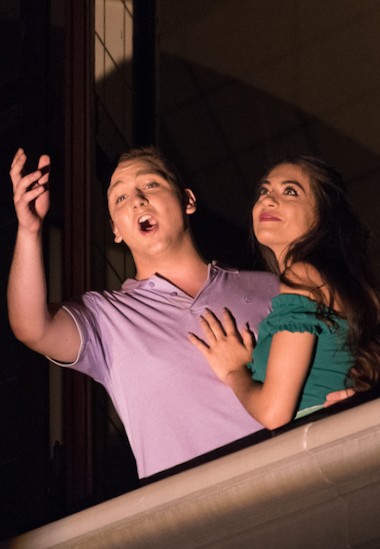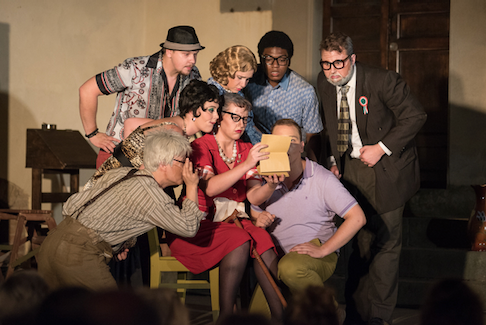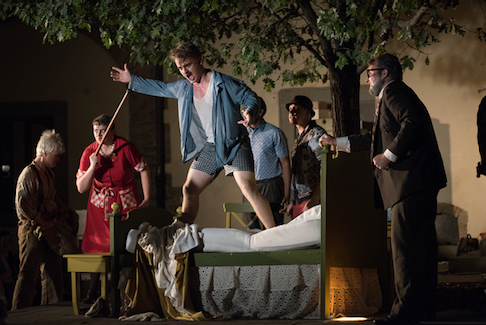Recently in Performances
English Touring Opera are delighted to announce a season of lyric monodramas to tour nationally from October to December. The season features music for solo singer and piano by Argento, Britten, Tippett and Shostakovich with a bold and inventive approach to making opera during social distancing.
This tenth of ten Live from London concerts was in fact a recorded live performance from California. It was no less enjoyable for that, and it was also uplifting to learn that this wasn’t in fact the ‘last’ LfL event that we will be able to enjoy, courtesy of VOCES8 and their fellow vocal ensembles (more below …).
Ever since Wigmore Hall announced their superb series of autumn concerts, all streamed live and available free of charge, I’d been looking forward to this song recital by Ian Bostridge and Imogen Cooper.
Although Stile Antico’s programme article for their Live from London recital introduced their selection from the many treasures of the English Renaissance in the context of the theological debates and upheavals of the Tudor and Elizabethan years, their performance was more evocative of private chamber music than of public liturgy.
Evidently, face masks don’t stifle appreciative “Bravo!”s. And, reducing audience numbers doesn’t lower the volume of such acclamations. For, the audience at Wigmore Hall gave soprano Elizabeth Llewellyn and pianist Simon Lepper a greatly deserved warm reception and hearty response following this lunchtime recital of late-Romantic song.
For this week’s Live from London vocal recital we moved from the home of VOCES8, St Anne and St Agnes in the City of London, to Kings Place, where The Sixteen - who have been associate artists at the venue for some time - presented a programme of music and words bound together by the theme of ‘reflection’.
'Such is your divine Disposation that both you excellently understand, and royally entertaine the Exercise of Musicke.’
‘And there was war in heaven: Michael and his angels fought against the dragon; and the dragon fought and his angels, And prevailed not; neither was their place found any more in heaven … that old serpent … Satan, which deceiveth the whole world: he was cast out into the earth, and his angels were cast out with him.’
There was never any doubt that the fifth of the twelve Met Stars Live in Concert broadcasts was going to be a palpably intense and vivid event, as well as a musically stunning and theatrically enervating experience.
‘Love’ was the theme for this Live from London performance by Apollo5. Given the complexity and diversity of that human emotion, and Apollo5’s reputation for versatility and diverse repertoire, ranging from Renaissance choral music to jazz, from contemporary classical works to popular song, it was no surprise that their programme spanned 500 years and several musical styles.
The Academy of St Martin in the Fields have titled their autumn series of eight concerts - which are taking place at 5pm and 7.30pm on two Saturdays each month at their home venue in Trafalgar Square, and being filmed for streaming the following Thursday - ‘re:connect’.
The London Symphony Orchestra opened their Autumn 2020 season with a homage to Oliver Knussen, who died at the age of 66 in July 2018. The programme traced a national musical lineage through the twentieth century, from Britten to Knussen, on to Mark-Anthony Turnage, and entwining the LSO and Rattle too.
With the Live from London digital vocal festival entering the second half of the series, the festival’s host, VOCES8, returned to their home at St Annes and St Agnes in the City of London to present a sequence of ‘Choral Dances’ - vocal music inspired by dance, embracing diverse genres from the Renaissance madrigal to swing jazz.
Just a few unison string wriggles from the opening of Mozart’s overture to Le nozze di Figaro are enough to make any opera-lover perch on the edge of their seat, in excited anticipation of the drama in music to come, so there could be no other curtain-raiser for this Gala Concert at the Royal Opera House, the latest instalment from ‘their House’ to ‘our houses’.
"Before the ending of the day, creator of all things, we pray that, with your accustomed mercy, you may watch over us."
The doors at The Metropolitan Opera will not open to live audiences until 2021 at the earliest, and the likelihood of normal operatic life resuming in cities around the world looks but a distant dream at present. But, while we may not be invited from our homes into the opera house for some time yet, with its free daily screenings of past productions and its pay-per-view Met Stars Live in Concert series, the Met continues to bring opera into our homes.
Music-making at this year’s Grange Festival Opera may have fallen silent in June and July, but the country house and extensive grounds of The Grange provided an ideal setting for a weekend of twelve specially conceived ‘promenade’ performances encompassing music and dance.
There’s a “slide of harmony” and “all the bones leave your body at that moment and you collapse to the floor, it’s so extraordinary.”
“Music for a while, shall all your cares beguile.”
The hum of bees rising from myriad scented blooms; gentle strains of birdsong; the cheerful chatter of picnickers beside a still lake; decorous thwacks of leather on willow; song and music floating through the warm evening air.
Performances

08 Aug 2018
Gianni Schicchi by Oberlin in Italy
It’s an all too rare pleasure to see Puccini’s only comedy as a stand alone opera. And more so when it is a careful production that uncovers the all too often overlooked musical and dramatic subtleties that abound in Puccini’s last opera.
Gianni Schicchi (1918), like Verdi’s Falstaff (1893), masterfully parses its dirty trick comedy among many players and many musical forms, though Puccini’s world is much evolved from that of Verdi, to include minstrel, jazz, Orientalism, musical alliteration, dissonance, spoken word, even a couple of old fashioned arias. Conductor Kevin Class did not miss a beat, making the most of every last bit of this stylistic richness, providing ample fodder for stage director Isabel Milenski’s [this critic’s daughter] canny take on Puccini’s comedy.
Even though Puccini’s hero — lifted from Dante’s Inferno — predates Verdi’s Shakespearean Falstaff by a few hundred years Schicchi’s wily, positive intelligence resonates in a modern, exploding world in ways Falstaffian self-indulgence simply cannot. Director Milenski’s Schicchi was 19 year-old [!] tenor Michael Butler who enthralled the audience with non-stop wit every bit as much as he enraged dead Buoso Donati’s relatives with his deceit.
Young Butler had lots competition in the charm department as this Gianni Schicchi was the first of three operas (with La Rondine in the Petrarca Opera House and Ariodante on the steps of the Church of the Assumption) presented gratis to to an enthusiastic public by Oberlin Conservatory’s summer program in Arezzo, Italy. The singers were essentially American undergraduates very much in the process of discovering their voices, finding their stage personae and, coincidently, learning Italian!
 Zita reading Buoso's will to his relatives
Zita reading Buoso's will to his relatives
To a man these were charming, talented young artists, vocally and dramatically coached in their roles by operatic professionals and meticulously rehearsed in Gianni Schicchi’s formidable ensembles, preparations that made this Gianni Schicchi into opera theater of solid effect.
Lyrically Gianni Schicchi belongs to the young lovers, Rinuccio and Lauretta, who were far closer to Puccini’s prescribed 21 and 18 year-olds than the usual big house lovers. It was a huge pleasure to watch Ethan Burck and Giuliana Bossa as they negotiated Puccini’s lovely lines with concentrated vocal thinking, finding themselves at last in a high window overlooking the courtyard of the Palazzo dei Priori (where we were seated) singing their contentment.
Scenic design credit goes mostly to the long ago architect of this 14th century palazzo who provided a big entry door through which the dying Buoso (prop master Luke D’Alessandro was himself this prop!) emerged onto the door’s porch (now a stage), led by Rinuccio to the bed where he expired to be stuffed (except for an arm) later into the armoire on another wall. Long ago someone had planted a tree to shade the porch into which old (well, maybe 20), furious Aunt Zita climbed, a perch from which she hurled dead Buoso’s pill bottles at Schicchi, and behind which pregnant Nella had a bit of morning sickness.
You get the idea — all of Buoso’s relatives were characters who did their natural thing without forcing comedy. And particularly Schicchi who tore up the stage in his “Si corre dal notaio,” playing to the hilt the smarts of a maximally personable auto mechanic like a hard sell vaudeville artist — Aunt Zita threw her cane at him which he then used to execute Puccini’s strutting and twirling.
 Betto, Zita, Schicchi, Rinuccio, Gherardo, Simone
Betto, Zita, Schicchi, Rinuccio, Gherardo, Simone
Not to mention Betto enacted by Korean American Simon Nam who shuffled and shook a spoon to Puccini’s pentatonic Butterfly quotations, and Zita, Nella and La Ciesca who did their best, with Puccini’s help (“Spogliati, bambolino”), to seduce Schicchi, casting suspicion on who might be the actual father of Nella’s expected child.
Conductor Class kept his tempi deliberate, and director Milenski effected highly theatrical stage pictures that camouflaged strategic sight-lines to the conductor, thus the well-known treacheries of the three formidable ensembles were painstakingly overcome — a feat that provided enormous satisfaction not to say relief to all involved — singers and spectators!
Finally Schicchi gave the spoken encomio (what better use for Buoso’s money than to seed the lives of the triumphant young lovers) in perfect Italian, an additional reward to us all thanks to the splendid efforts of Oberlin in Italy.
Michael Milenski
Cast and production information:
Gianni Schicchi: Michael Butler; Rinuccio: Ethan Burck; Lauretta: Giuliana Bossa; Zita: Helena Crothers; Nella: Madison Williams; La Ciesca: Emma Webster; Simone: Thomas Petrushka; Betto: Simon Nam; Gherardo: Matteo Adams; Gherardino: Jenna Venturi; Marco: Lukasz Zienturski; Doctor / Notary: Robert Raso; A cobbler: Seth Tack; A dyer: Alex Smith. Orchestra: L'Orchestra AgrimusArte. Conductor: Kevin Glass; Stage Director: Isabel Milenski; Stage Design: Elizabet Puksto; Costume Design: Clara Fath; Lighting Design: Christian Londos. Cortile del Palazzo dei Priori, July 27, 2018.


